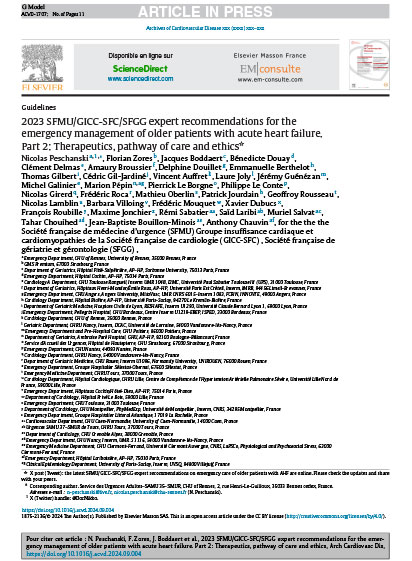
Archives of Cardiovascular Diseases
Article du mois - Novembre 2024
Nicolas Peschanski, Florian Zores, Jacques Boddaert, Bénedicte Douay,Clément Delmas, Amaury Broussier, Delphine Douillet, Emmanuelle Berthelot,Thomas Gilbert, Cédric Gil-Jardiné, Vincent Auffret, Laure Joly, Jérémy Guénézan, Michel Galiniere, Marion Pépin, Pierrick Le Borgne, Philippe Le Conte, Nicolas Girerd, Frédéric Roca, Mathieu Oberlin, Patrick Jourdain, Geoffroy Rousseau,Nicolas Lamblin, Barbara Villoing, Frédéric Mouquet, Xavier Dubucs, François Roubille, Maxime Jonchier, Rémi Sabatier, Saïd Laribi, Muriel Salvat,Tahar Chouihed, Jean-Baptiste Bouillon-Minois, Anthony Chauvin, for the the the Société Française de Médecine d’Urgence (SFMU), Groupe Insuffisance Cardiaque et Cardiomyopathies de la Société Française de Cardiologie (GICC), Société Française de Gériatrie et Gérontologie (SFGG)
Background
Acute heart failure (AHF) is a complex, multifactorial, syndromic condition with various therapeutic options in the emergency setting and during the hospital stay [1,2]. Managing older patients with AHF involves several critical steps, including therapeutic interventions, pathway of care and ethical considerations [3]. Rapid diagnosis through symptoms such as dyspnoea, orthopnoea andoedema, initial assessment of symptoms and stabilization of major vital functions are the keys to therapeutic management [1–3]. Medical interventions include diuretics to relieve congestion andachieve optimal fluid status to manage fluid overload [4], vasodilators for patients with hypertension-induced AHF to reduce cardiac workload and non-invasive ventilation in patients with respiratory failure [5]. In addition, pharmacological treatments may include inotropic agents for patients with low cardiac output [1,2]. In older patients with AHF, the pathway of care often starts in the emergency department (ED) [6]. AHF management includes risk stratification to assess severity and co-morbidities, to determine the appropriate level of care, and early therapeutic intervention to initiate guideline-directed medical therapies before discharge from the ED [3,6]. After hospital admission, there is monitoring of vital signs, fluid balance and response to treatment. A multidisciplinary approach, involving cardiologists, geriatricians and other specialists, ensures close follow-up to prepare post discharge care and prevent rehospitalization [6,7]. Managing older patients with AHF requires a comprehensive approach that integrates rapid therapeutic interventions, a structured pathway of care and ethical considerations to ensure the best possible outcomes. Furthermore, it requires balancing of aggressive treatment with the patient’s quality of life, and consideration of palliative care options when appropriate [1,2,6,7]. Indeed, resource allocation involves making ethical decisions regarding the use of limited resources, especially in emergency settings. Physicians and caregivers involved in the pathway of care should educate patients and caregivers on medication adherence and lifestyle modifications [7]. Ethical considerations should ensure that patients understand their condition and treatment options by informed consent, to respect patient autonomy in decision-making.